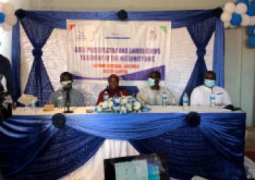
The ceremony was held at GRCS headquarters in Kanifing.
Chabai Saidy, Director Department of Water Resources said the materials will go a long way to improve the lives and livelihoods of vulnerable children and women in The Gambia.
He added that his office implements programmes and activities for the construction and rehabilitation of water supply systems and sanitation facilities for schools and health facilities across five administrative regions of the country.
He called on partners to work hand in glove to chlorinate and maintain their water systems for sustainability as well as ensure quality standard of potable water supply in beneficiary communities.
Lamin Dampha, Permanent Secretary Ministry of Healthsaid they shouldendeavor to strengthen hygiene promotion to utilise people's existing knowledge, practices and resources supported by sound health promotion techniques before or during the distribution of these materials.
He thanked UNICEF for the initiative and assured them of government’s commitment in partnering with them particularly on activities that affect women and children.
Gordon Jonathan Lewis,UNICEF County Representative said the items were secured with funding from the Government of Denmark as part of the COVID-19 response support in The Gambia.
He stated that the support will go a long way to strengthen national capacities to deliver lifesaving interventions for the children of The Gambia.
He noted that the unavailability of safe water supply in health facilities makes childbirth delivery unhygienic and unsafe, exposing mother, child, and even health service providers to infections. “A major cause of death among newborns (0-28 days old) in The Gambia is sepsis, arising from infections after birth,” he stated.Therefore, improving the availability of and access to running water in health facilities will reduce infections and improve neonatal survival rates in The Gambia.
According to him, although The Gambia has not had a major public health emergency in recent years, climate change and rapid environmental degradation continue to be real threats to ensuring water safety especially in communities exposed to poor sanitation as the practice of open defecation presents risks of disease outbreaks.
He highlighted that WASH emergency materials, nutrition, and public health interventions are crucial to reduce the risks and impact of disasters on the most vulnerable groups such as children, women, those with different abilities, and the elderly. Provision of adequate water, sanitation, and hygiene facilities and supplies before, during, and after emergencies contributes greatly to the reduction of public health risks such as diarrhea, cholera, COVID-19 and other outbreaks, he further stated.
He expressed appreciation to GRCS management and staff for their professionalism, diligence, and hard work especially during the pandemic.
Alasan Senghore, Secretary-General Gambia Red Cross Society said the beginning of the rainy season has brought many humanitarian challenges, particularly in rural areas.
He added thatchallenges of water, sanitation and hygiene continue to persist in communities with government not being able to do it all alone.
He expressed GRCS’s willingness to continue investing towards providing access to water.




